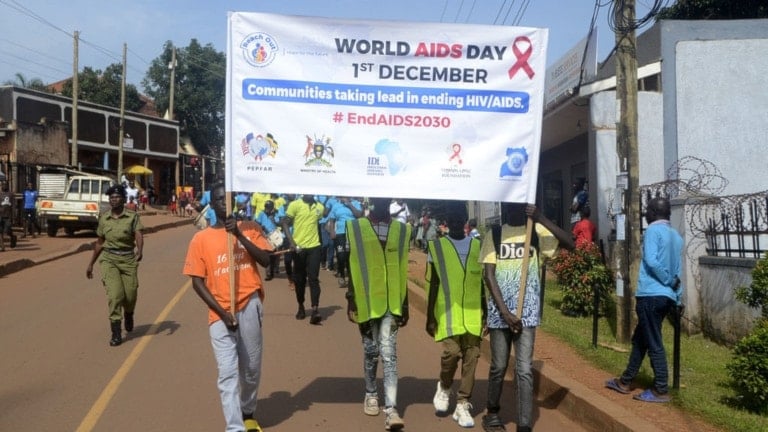$42,000-a-year HIV vaccine trialed in Africa
The drug has a 100% efficacy rate in preventing HIV infections among women, according to the manufacturer.
-

A group of Ugandan citizens mark World AIDS Day in Kampala, Uganda, undated. (AFP/Getty Images)
Gilead Sciences Inc., a US biopharmaceutical company, has announced that an experimental vaccine has shown 100% efficacy in preventing HIV infections among women following trials conducted in South Africa and Uganda.
Last week, Gilead Sciences Inc. announced trials involving approximately 5,300 women aged 16 to 25 for the twice-yearly lenacapavir shot. Participants were either administered lenacapavir or the company’s older Truvada medication that is taken orally once daily.
“First Phase 3 HIV Prevention Trial Ever to Show Zero Infections,” the company said in a press release published on its website. “The results demonstrated the superiority of twice-yearly lenacapavir [over Truvada]” and exceeded the company’s expectations, it added.
“With zero infections and 100% efficacy, twice-yearly lenacapavir has demonstrated its potential as an important new tool to help prevent HIV infections,” said Merdad Parsey, chief medical officer of Gilead Sciences. “We look forward to additional results from the ongoing PURPOSE clinical program and continuing toward our goal of helping to end the HIV epidemic for everyone, everywhere,” he added.
Read next: Gene-editing unlocks hope for HIV cure
In 2022, the US Food and Drug Administration (FDA) approved lenacapavir, marketed under the brand name Sunlenca, for treating HIV infections in adults. The medication is expected to cost $42,250 in the first year and $39,000 annually. Critics contend that the primary hurdle to providing the medication to Africa would be its cost.
Melb Simiyu, an HIV prevention officer in Uganda, stressed that for PrEP (Pre-exposure prophylaxis) drugs to be within reach in the world’s poorest nations, the annual price must stay below $100. She told the media, "If it’s a lot more than that, we’re sunk."
Activist groups have urged Gilead to enable access to lenacapavir. In response, the company stated it is actively seeking partners capable of providing high-quality, low-cost versions of the medication.
According to global statistics, approximately 39 million people worldwide are living with HIV, including 1.5 million children. Africa bears a disproportionate burden with 25.6 million cases.

 2 Min Read
2 Min Read








